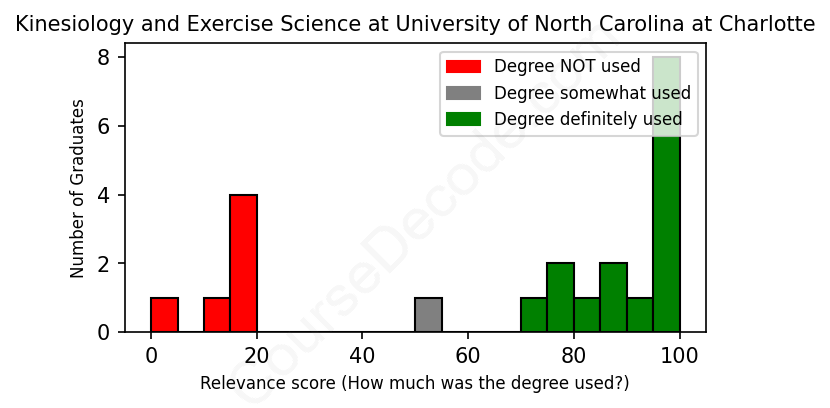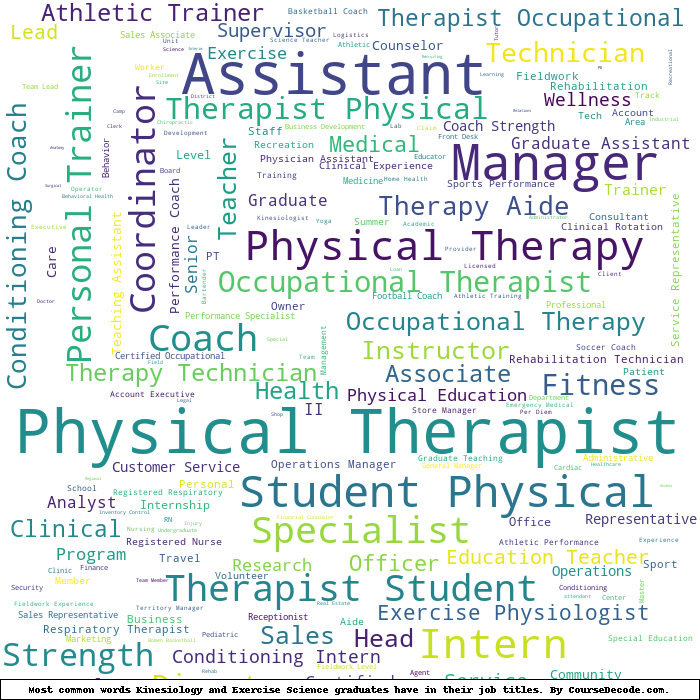
First, some facts. Of the Kinesiology and Exercise Science graduates from University of North Carolina at Charlotte we've analyzed , here's how many have used (or NOT used) their degree in their career:

These are estimates based on AI analysis of 22 LinkedIn profiles (see below).
The verdict? Slightly above average. Overall, with an average relevance score of 68%, Kinesiology and Exercise Science graduates from University of North Carolina at Charlotte have a slightly higher likelihood (+1%) of finding work in this field compared to the average graduate across all fields:
And for comparison, here's the chart for all profiles we've looked at across all degrees.
Also, after graduating, 40% of these graduates have pursued further education other than another Bachelor's degree (such as a Masters degree or other), compared to the average across all profiles of 35%. This suggests you may need more than just a Bachelors degree to be competitive as a Kinesiology and Exercise Science graduate.
See the details:
|
Relevance score: 100% We think this person has gone into a career highly relevant to their degree. We think this person has gone into a career highly relevant to their degree.
DEGREE INFOGraduated in 2014 from University of North Carolina at Charlotte with a Bachelor's Degree in Kinesiology and Exercise Science. Also pursued further education since (see below). JOB HISTORY SINCE GRADUATIONDoctor Of Physical Therapy IREDELL MEMORIAL HOSPITAL INCORPORATED Feb 2018 - Present FURTHER DEGREES DONE SINCE GRADUATINGPhysical Therapy/TherapistWingate University 2015 - 2017 ABOUTNo information provided. |
The top 10 most common jobs done by the graduates we've analyzed (ranked most common to least) are:
Looking at the job paths of graduates from the University of North Carolina at Charlotte with a degree in Kinesiology and Exercise Science, we can see a pretty diverse range of career choices. A lot of them find roles related to health and fitness, such as Exercise Specialists, Physical Therapists, and Health Educators. These positions usually draw directly on the skills and knowledge they acquired during their studies, helping them apply principles of human anatomy, exercise programming, and rehabilitation in real-world settings. It’s great to see that many graduates end up in roles that are clearly tied to their education, especially in healthcare and fitness environments where their expertise is crucial for client success and safety.
However, not all paths are so directly connected to kinesiology. Some grads have taken positions like marketing roles or event coordinators that don’t align as nicely with their core studies. While they might gain some transferable skills, the connection to Kinesiology and Exercise Science often feels more like a loose association than a practical application. This suggests that while the degree provides a solid foundation, some graduates venture into areas that might not fully utilize their specialized training, which can be a bit of a mixed bag when it comes to creating a fulfilling career in their chosen field. Overall, though, a significant number of UNC Charlotte's graduates seem to effectively integrate their academic background into their professional lives, especially within health and fitness sectors.
Here is a visual representation of the most common words in job titles for Kinesiology and Exercise Science graduates (this is across all Kinesiology and Exercise Science graduates we've analyzed, not just those who went to University of North Carolina at Charlotte):

Based on the career trajectories of graduates from the University of North Carolina at Charlotte with degrees in Kinesiology and Exercise Science, it seems that many individuals start out in job roles that are somewhat related to health and fitness immediately after graduation. Positions like fitness instructors, exercise specialists, and health educators appear to be common first jobs, reflecting a direct application of their studies. Over the years, many graduates have transitioned into more specialized roles, such as physical therapists and exercise physiologists—a natural progression for those who have pursued further certifications and education. However, there are also examples of graduates who have veered off the traditional path and found themselves in varied roles like marketing coordinators or project managers, which might not connect directly to their degree but still offer valuable skills and opportunities.
Five to ten years down the line, many of these graduates seem to be successfully establishing themselves within the fields of health and fitness, continuing to build on their kinesiology foundation. A number of them have advanced to managerial or specialized roles, indicating a promising career trajectory tied to their education. On the other hand, a significant portion have taken on roles that diverge from Kinesiology and Exercise Science, suggesting that while some graduates thrive in relevant careers, others may find success in an entirely different direction than what their degree would typically prepare them for. Overall, the landscape is quite mixed but does show that there is potential for growth and longevity for students from this program, whether in or outside of traditional pathways associated with Kinesiology.
Honestly, the Bachelor’s degree in Kinesiology and Exercise Science can be a bit of a mixed bag—it really depends on how you approach it. Some people find it manageable because there’s a good balance of theory and practical work, plus if you’re into sports and fitness, it feels a bit more fun than heavy academics like engineering or physics. That said, it does have challenging aspects, especially if you’re not super comfortable with science courses like anatomy and physiology. Overall, I’d say it’s not as hard as some of the more intense majors, but you still need to put in the effort to keep up with the coursework and hands-on activities. If you’re passionate about the subject, it’ll probably feel easier, so just dive in and give it your all!
Most commonly, in the LinkedIn profiles we've looked at, it takes people 4 years to finish a Bachelor degree in Kinesiology and Exercise Science.
So, looking at the job histories of these Kinesiology and Exercise Science grads from UNC Charlotte, it seems like they’re kind of all over the place in terms of income. Some have climbed the ladder pretty well, like the general manager who eventually opened their own gym, which could definitely lead to decent earnings. Others started off with internships and gradually moved into roles that might not pay as well right away, like working as exercise specialists or in event coordination, which can vary quite a bit when it comes to salary. Plus, some are still at the beginning of their careers, so it’ll take some time to see where they land financially. Overall, it seems a bit mixed; some are doing well, while others might still be figuring things out in terms of making solid cash.
Here is a visual representation of the most common words seen in the "about" section of LinkedIn profiles who have a Bachelor degree in Kinesiology and Exercise Science (this is across all Kinesiology and Exercise Science graduates we've analyzed, not just those who went to University of North Carolina at Charlotte). This may or may not be useful:

Here are all colleges offering a Bachelor degree in Kinesiology and Exercise Science (ordered by the average relevance score of their Kinesiology and Exercise Science graduates, best to worst) where we have analyzed at least 10 of their graduates: